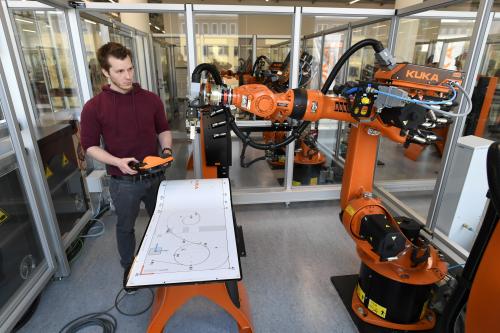The Czech Republic is in many ways a Central European success story. Driven by foreign direct investment (FDI) and strong participation in global value chains, the booming Czech manufacturing sector now leads all sectors in terms of employment and gross value added. However, two key challenges threaten this success: an increasingly acute labor shortage and low labor productivity.
The Czech unemployment rate fell to 2.4 percent in 2018, far below the EU average of 8.2 percent, and labor shortages have become an increasing concern for Czech firms. At the same time, the Czech economy is challenged by weak labor productivity and labor productivity growth. Labor productivity per hour worked was $38 in 2017, only 86 percent of German productivity levels. Firm-level data shows that Czech small and medium-sized enterprises (SMEs), in particular, drag down the country’s labor productivity, with small firms experiencing about half the labor productivity of larger Czech firms.
Czechia, like its Central European neighbors, is now at risk of experiencing a variation of the middle-income trap, where the past manufacturing-based success is no guarantee of a future one. The term “middle-income trap,” coined by Indermit Gill and Homi Kharas in 2007, describes the situation where a country can no longer compete internationally in labor-intensive industries because wages have increased, but it can also not compete in higher value-added activities because productivity is too low. Does this sound familiar?
This double challenge could potentially be overcome by the anticipated wave of digitization and automation technologies, known as Industry 4.0, which, if properly integrated, could boost productivity while also substituting out labor. Developing and adopting advanced manufacturing technologies is not simple: New operational technologies, like advanced robots and autonomous production, require sizeable upfront investments and a specialized workforce to develop and operate them. Despite its successful manufacturing sector, Czechia lacks the market, workforce, and economies of scale of its neighbors, Germany and Austria. The question is whether Czechia and similar economies are prepared for this new digital wave.
As part of the ongoing World Bank Industry 4.0 Flagship Report, we conducted a case study of Czech disruptors who potentially hold the key for upgrading the Czech manufacturing sector by developing new digital solutions. We identified around 50 startups developing innovative Industry 4.0 technologies and asked them about the most pressing challenges facing their companies. One such startup is Sewio, a Brno-based startup that developed a real-time indoor location tracking system that helps its clients track objects in locations where GPS doesn’t work. Sewio now has customers in 37 countries including Volkswagen, Budweiser Budvar, Pirelli, and Škoda.
The journey of Industry 4.0 startups: What did we learn?
It’s hard to manufacture an Industry 4.0 startup. These entrepreneurs face several challenges beyond those faced by a “typical” ICT-based startup. Because of the sometimes disruptive nature of these technologies, high upfront investment costs and entrenched market power of trusted global Industry 4.0 solution providers, the barriers of market entry are considerably higher. Notably, for potential adopters, the risk is higher given that the margin for error in manufacturing products is smaller than other industries; any disruptions can result in production downtime and lost revenues.
Getting early customers often requires a plant manager or executive willing to “take a chance” on a new company and product where others will not. Many Czech startups found their first customer in Czechia, where they tested and validated their solutions. These first customers are often critical to the development and survival of Industry 4.0 startups. They provide access to data needed to develop their digital solutions, train algorithms, model systems, and/or calibrate equipment. They also provide testbeds and demonstration sites for the startups to pilot and validate their technologies in real-world environments.
Even after startups have validated their products with one or more early adopters, additional customers often feel pilots are necessary to demonstrate the solution’s benefits, and, more critically, ensure that the solution will not disrupt important company processes and operations. Pilots include an assessment period, after which the adopting company may spend some time deliberating whether to adopt at a wider scale. This pilot-assessment-deliberation process can extend procurement timelines by years and severely restrict the cash flows of Industry 4.0 startups.
One way around this pilot process is to partner with incumbent solutions providers, who can provide startups with access to a broad customer network under a trusted brand name. Sewio, for example, worked with Cisco and PwC, who were both looking for new products to expand their “internet of things” capabilities. These partnerships often lead to acquisitions of startups by the established providers. In fact, there have been two such acquisitions in Czechia in the last two years: Cleerio, which develops mapping and asset management tools, was acquired by BioNexus in 2017, and Stories, developer of a business intelligence AI assistant, was acquired by Workday in 2018.
What can be done about it?
Czech and European policymakers can help alleviate some of the stresses facing Industry 4.0 startups and remove some of the informational barriers facing entrepreneurs, investors, and adopters—especially SMEs. Most importantly, increasing the supply of digital skills will be critical to the country’s capacity to develop and absorb Industry 4.0 technologies, and thus, digital skill development should be central for national level-policies and strategies. Innovation agencies and industry associations can also promote successful business cases of Industry 4.0 adoption among SMEs, showcasing how specific technologies could generate productivity and competitiveness impacts. Czech authorities can also design competitions that incentivize data-generation and create a marketplace for data sharing related to manufacturing and industry processes; the CoFIT program by the Technical University in Prague is an example of such platforms. Finally, concentrated efforts to increase national investments in Industry 4.0-related research will be needed, leveraging European initiatives and resources such as AI4EU, as well as removing the persistent barriers to research collaboration and technology transfer.
The Brookings Institution is committed to quality, independence, and impact.
We are supported by a diverse array of funders. In line with our values and policies, each Brookings publication represents the sole views of its author(s).








Commentary
Why should Czechia take Industry 4.0 seriously?
September 13, 2019